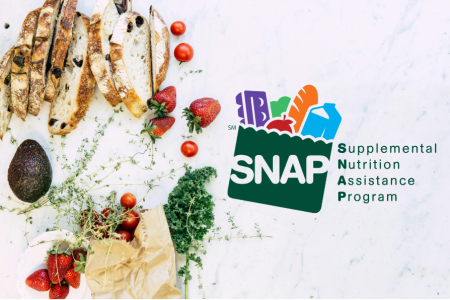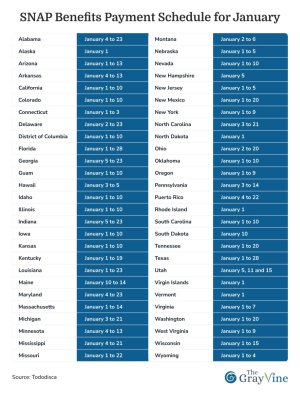Could you lose SNAP benefits? Key circumstances that may affect eligibility
By
Aubrey Razon
- Replies 0
Are you at risk of losing your Supplemental Nutrition Assistance Program (SNAP) benefits? Discover the key factors that could cut you off from vital assistance.
Stay informed with The GrayVine to protect your access to food stamps.
SNAP is designed to provide nutritional support to millions of eligible low-income individuals and families across the United States.
However, maintaining eligibility is not a one-time event; it requires ongoing compliance with a set of stringent requirements. Let's break down the key factors that determine SNAP eligibility:

1. Residency and Citizenship
To qualify for SNAP, you must be a US citizen or a legal non-citizen who meets certain criteria.
This foundational requirement ensures that the program serves those within the legal jurisdiction of the U.S. government.
2. Income Limits
Your household's financial situation is a critical determinant.
SNAP has both gross and net income limits, generally set at 130% and 100% of the federal poverty level, respectively.
These thresholds are designed to prioritize assistance to those who need it most.
3. Asset Thresholds
Financial resources, such as savings and checking accounts, are also scrutinized.
For most households, assets must be below $2,750, but this limit increases to $4,250 for households with an elderly or disabled member.
4. Work Requirements
Able-bodied adults without dependents (ABAWDs) are expected to work at least 20 hours per week or participate in qualifying job training programs.
These requirements emphasize the program's goal of supporting those actively seeking to improve their economic situation.
5. Documentation
Valid identification and proof of income, along with housing expenses, are necessary to verify your eligibility.
This documentation helps prevent fraud and ensures that benefits go to the rightful recipients.
6. Special Considerations for Seniors and Disabled Individuals
If you're over 60 or have a disability, there are additional deductions and rules that may apply, recognizing the unique challenges faced by these groups.
Even if you've been receiving SNAP benefits, certain changes in your circumstances can lead to disqualification. Here are some scenarios that could put your SNAP benefits at risk:
SNAP benefits are typically distributed on a monthly basis, with each state setting its own schedule.
It's important to know your state's schedule to plan your grocery shopping accordingly.

To ensure you continue to receive SNAP benefits, consider the following tips:

Have you faced challenges with maintaining SNAP eligibility? Do you have tips for managing the re-evaluation process or maximizing benefits? Share your experiences and tips in the comments below.
Stay informed with The GrayVine to protect your access to food stamps.
SNAP is designed to provide nutritional support to millions of eligible low-income individuals and families across the United States.
However, maintaining eligibility is not a one-time event; it requires ongoing compliance with a set of stringent requirements. Let's break down the key factors that determine SNAP eligibility:

SNAP Food Stamps are monthly benefits for eligible Americans. Image source: U.S. Department of Agriculture and Elle Hughes/Pexels.
1. Residency and Citizenship
To qualify for SNAP, you must be a US citizen or a legal non-citizen who meets certain criteria.
This foundational requirement ensures that the program serves those within the legal jurisdiction of the U.S. government.
2. Income Limits
Your household's financial situation is a critical determinant.
SNAP has both gross and net income limits, generally set at 130% and 100% of the federal poverty level, respectively.
These thresholds are designed to prioritize assistance to those who need it most.
3. Asset Thresholds
Financial resources, such as savings and checking accounts, are also scrutinized.
For most households, assets must be below $2,750, but this limit increases to $4,250 for households with an elderly or disabled member.
4. Work Requirements
Able-bodied adults without dependents (ABAWDs) are expected to work at least 20 hours per week or participate in qualifying job training programs.
These requirements emphasize the program's goal of supporting those actively seeking to improve their economic situation.
5. Documentation
Valid identification and proof of income, along with housing expenses, are necessary to verify your eligibility.
This documentation helps prevent fraud and ensures that benefits go to the rightful recipients.
6. Special Considerations for Seniors and Disabled Individuals
If you're over 60 or have a disability, there are additional deductions and rules that may apply, recognizing the unique challenges faced by these groups.
Even if you've been receiving SNAP benefits, certain changes in your circumstances can lead to disqualification. Here are some scenarios that could put your SNAP benefits at risk:
- An increase in household income that exceeds the program's limits.
- Accumulation of assets beyond the allowable threshold.
- Failure to comply with work requirements without a valid exemption.
- Inaccurate or incomplete documentation during the re-evaluation process.
SNAP benefits are typically distributed on a monthly basis, with each state setting its own schedule.
It's important to know your state's schedule to plan your grocery shopping accordingly.

Source: Tododisca.
To ensure you continue to receive SNAP benefits, consider the following tips:
- Keep your local SNAP office informed of any changes in your income, assets, or household composition.
- Maintain accurate records and documentation to streamline the re-evaluation process.
- Understand the work requirements and seek assistance from job training programs if needed.
- For seniors and disabled individuals, be aware of the additional deductions you may qualify for to maximize your benefits.
Key Takeaways
- SNAP Food Stamps are monthly benefits for eligible Americans, with specific requirements that must be met to receive them.
- Eligibility for SNAP Food Stamps includes criteria such as residency, income, assets, work requirements, and age/disability status.
- Documentation such as personal identification, proof of income, and housing bills are necessary to apply for SNAP benefits.
- SNAP Food Stamps benefits are distributed on scheduled dates in each state, and recipients use an EBT card to access the funds at participating establishments.
Last edited:






